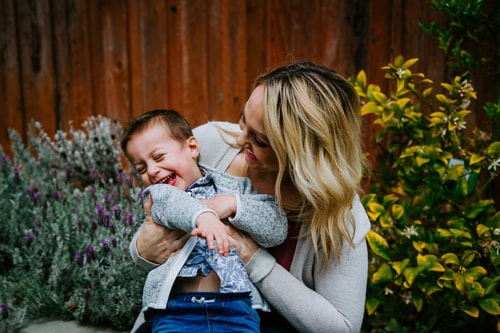It is the time of year again when Mother’s Day is just around the corner. For some women this is a day of joy, marking the birth or adoption of a child, and for other people it is a chance to celebrate their mothers. If we are to look at the commercial offering of cards and gifts online or on our high streets, it could be easy to forget that for many people, Mother’s Day is not a time of celebration at all.
At Care for the Family we are all too aware of the pain and difficulty that Mother’s Day can bring. For some this will be a day of grief, mourning or loss; of dashed hopes, strained relationships and anxiety. Rather than a day of laughter, it will be a day of tears. Many will be carrying their experiences privately, so we may not even know the extent of the sadness in our midst.
Rejoicing with those who rejoice and mourning with those who mourn
As churches and as Christians within our communities, how do we lovingly embrace the complexities of this significant day in our society’s calendar? How do we find that balance of rejoicing with those who rejoice and mourning with those who mourn?
When Jesus arrived on the outskirts of Bethany, He was met by a crowd of people. They were mourning the loss of Lazarus, one of Jesus’ closest friends. Met by a wall of grief, hearing the cries and seeing the tears of Lazarus’ family and community, Jesus wept too. Jesus joined them in their sadness and confusion at what seemed like a hopeless situation.
Days afterwards Jesus returned to Bethany and sat down with a resurrected Lazarus and his family. At this meal (known for Mary’s anointing of Jesus), He rejoiced with the community.
We hear you, we see you
Within churches, it is important that we acknowledge the reality that Mother’s Day will affect women in different ways. We should not forget either, that for many men and children, this day can also be one of sadness, anxiety, hopelessness or joy. Just as Jesus saw and heard the mourners at Bethany, so we have the opportunity to acknowledge those in our midst who may be far from a place of rejoicing.
Are there opportunities within your community to acknowledge the often unspoken hurt that can accompany this day? Perhaps it is a chance to support a baby loss charity, to champion fostering and adoption, or to send a card to someone you know who will particularly struggle this year. At Care for the Family, our Bereaved Parent, and Widowed Young Support offers help to those who are living with loss to discover hope for the future and the strength to rebuild their lives and the lives of their families.
Taking time within the church service on Mother’s Day to recognise the full range of emotions that people may be experiencing is so important – whether that is during a prayer or some words spoken from the front. It could be a time of silence, or meditation with music. In children’s and youth groups, perhaps take some time to talk about the significance of Mother’s Day. Explain that the day can bring feelings of sadness or confusion to some in our midst. In creating spaces where people of all ages feel noticed and valued, we are saying, “We hear you, we see you.”
We are with you
“Jesus wept.” This is the shortest verse in the Bible, and yet in those two words, so much is communicated. The creator of the world wept with His community. He joined them, entered into their grief, and connected with them. How can we follow Jesus’ lead in this?
Are we able to offer practical support to those who have lost children or parents during the pandemic? The sense of isolation people have experienced over the last two years has been unprecedented. What opportunities might there be to visit and chat to (or simply sit with) those who will be apprehensive about Mother’s Day? As a church, could we proactively commit to supporting people long after an initial loss or struggle? It is worth remembering that their pain will not reduce on the Monday after Mother’s Day. Care for the Family’s Bereavement Care Awareness Training for churches can help and equip you to support bereaved people in your congregations and communities. Perhaps we can follow Jesus’ lead by simply weeping with people. In standing with people, we are saying, “we are with you.”
We celebrate you
And what of rejoicing? Care for the Family exists to support families in the difficult times and the good times. Often in life and in our communities, we experience both at the same time. Therefore along with mourning with those who mourn, it is entirely right that we should rejoice with those who rejoice. Just as Jesus celebrated with Lazarus and his community at the appropriate time, so we should do so with those for whom Mother’s Day brings joy and happiness. Care for the Family are touring with Mum’s Night Out this spring. It will be an evening celebrating mums, and if we are coming to a venue near you, perhaps you could treat your mums to a well-deserved night out!
At church on Mother’s Day we can sensitively acknowledge motherhood, giving thanks for the children in our midst and celebrating the lives of all women. Could you, as some churches do, give every woman a flower on Mother’s Day? Or could you help the children create a simple craft that they could give as gifts to every woman?
As we approach Mother’s Day this year, may we follow the lead of Jesus as He teaches us the pattern of mourning and rejoicing – entering into people’s lives, rejoicing with those who rejoice and mourning with those who mourn.



